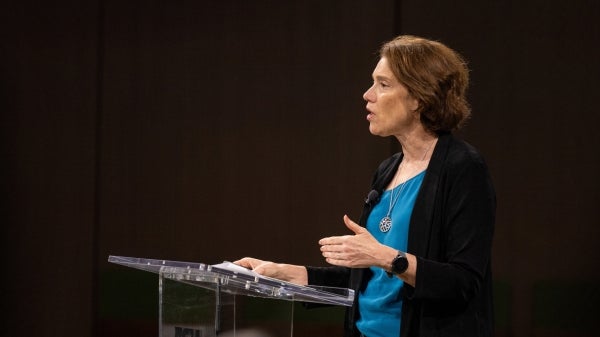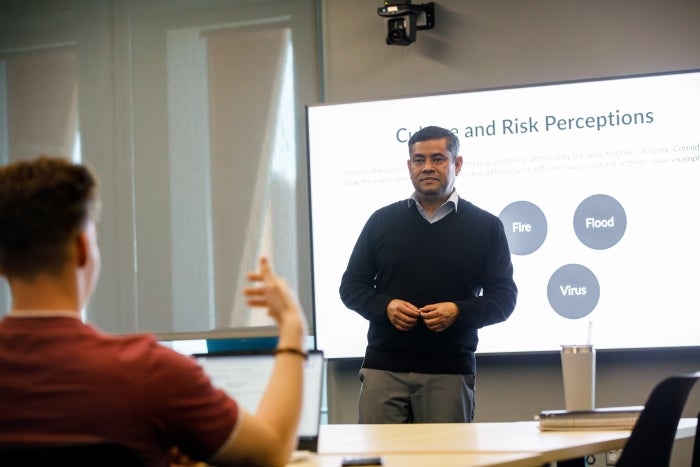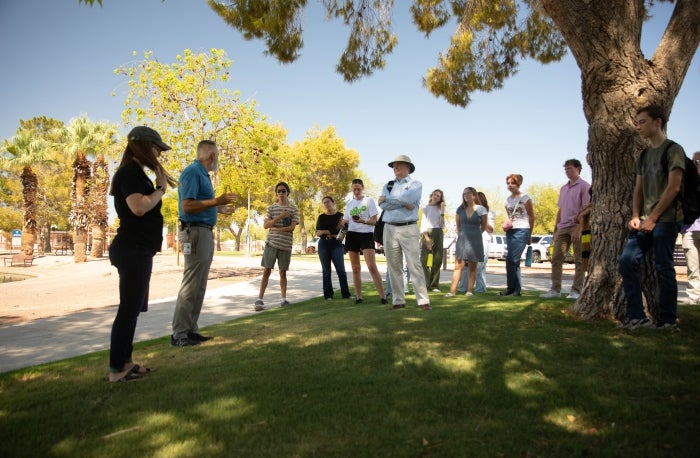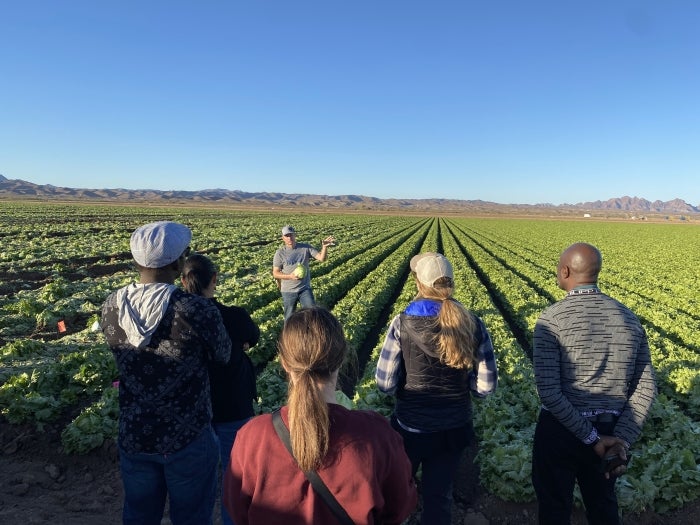ASU empowers students to build a thriving global future

Arizona State University College of Global Futures students walking across the bridge over University Drive connected to the Walton Center for Planetary Health. From left to right: Ava Steckel, Sophia Vallejera and Caleb Lieberman. Photo courtesy Andy DeLisle
At Arizona State University, leadership has made tremendous efforts to create programs and initiatives aimed at supporting a healthy planet and thriving future for all life — and now, more than ever, youth voices will be essential to the conversation.
One such effort, drawn from its charter and design aspirations, is ASU’s recent update to their general studies curriculum requirements. General Studies Gold, which specifies requirements for undergraduate students in the catalog year 2024–25 and beyond, has a number of changes from previous iterations — most notably the new Quantitative Reasoning, Governance and Civic Engagement, American Institutions, and Sustainability categories.
Read more about the new curriculum rollout.
“The goal of General Studies Gold is to empower students with skills and knowledge from outside their major,” said vice provost for undergraduate education, Anne Jones. “From this interdisciplinary foundation, students will study both enduring questions and modern methods of problem-solving, so that they are prepared to contribute solutions to the challenges facing our present and future.”
To address these complex, global challenges, our world will need the help of tomorrow’s leaders.
The College of Global Futures — based within the Julie Ann Wrigley Global Futures Laboratory and its four schools — provides ASU students with the knowledge, skills and opportunities to pursue those goals.
“We believe that ASU students — the leaders of today and tomorrow — have great agency in designing a future in which life can thrive on a healthy planet,” said Peter Schlosser, acting dean of the College of Global Futures and vice president of the Julie Ann Wrigley Global Futures Laboratory.
“We have to prepare all ASU students to address the challenges of our time and capitalize on the opportunities that come as part of the urgently needed sustainability innovation. As the prototype of the university for the future of our planet, the Julie Ann Wrigley Global Futures Laboratory is uniquely positioned to provide an academic experience for students across ASU to pursue those goals,” Schlosser said.
As a member of the General Studies Council, José Lobo, a clinical associate professor in the School of Sustainability, had a front row seat for the development and deployment of General Studies Gold. More specifically, Lobo was involved in crafting one of the new knowledge areas — Quantitative Reasoning.
The new categories provide a breadth of knowledge that is aimed to help students be better citizens and thinkers, according to Lobo.
Perhaps the most distinctive feature of the new general studies requirements is the addition of "Sustainability Thinking."
“Most universities have mathematics, social science or natural science requirements but not sustainability thinking,” Lobo said. “I would argue this is where the general studies requirement most reflects the vision that's governing ASU as a university.”
The changes to the required topic areas are meant to expose future ASU undergraduate students to a systems thinking approach. They will have the opportunity to envision the future version of the planet and how they may contribute to a prosperous life for all.
“This is ASU’s statement to the world, to students, to the parents of students, that we believe that an undergraduate education needs to equip and teach students what are the challenges and opportunities of sustainable development,” Lobo said.
Beyond the new categories, Lobo says that the changes to what is required for a course to be listed within a category is key. These changes are more than simply checking a box to fit within the category, but will transform the way courses are taught at a holistic level.
It starts with the learning outcomes of a course.
“The emphasis here is transparency to the students,” Lobo said. “What should I expect this course to teach me? What are the learning outcomes?”
The College of Global Futures undergraduate majors — ranging from sustainability to innovation in society — directly pull from many of the themes highlighted in the new General Studies Gold requirements. They prepare students to address complex emerging issues like climate change, social justice, food and water security, ocean health and responsible innovation surrounding new technologies.
In the spirit of Earth Week, here are courses that students can take to shape a better tomorrow.
SOS 110: Building a Sustainable World
What is it: SOS 110: Building a Sustainable World lays the groundwork for understanding the fundamental geological, biological and social processes that gave rise to the world we live in and how to maintain its viability for human life.
Why it matters: This course serves as an introduction to sustainability as a transdisciplinary area of study and how it can be used to shape our global future. To create solutions to our contemporary issues, students will need to be able to understand systems-level thinking on how nature works and its socio-economic intersections. Students are introduced to the different career paths within the field and the various ways in which they can be pursued academically.
Who’s teaching: This course is taught by School of Sustainability Associate Teaching Professor Milan Shrestha, whose research focuses on how our sociocultural and economic background influences how we perceive and adapt to climate change, which improves our understanding of how vulnerable populations are responding to environmental change.
If you register: SOS 110: Building a Sustainable World fulfills the Sustainability (SUST) General Studies Gold requirement and the Social-Behavioral Sciences (SB) category within General Studies Maroon. It has multiple online offerings next fall during sessions A and B, and on the Tempe campus during session C (class #87491).
CGF 110: Resilient American Futures: An Academic Road Trip
What is it: CGF 110: Resilient American Futures is an alignment with the Ten Across initiative. It focuses on pressing resilience problems impacting America's communities along the 2,400-mile Interstate 10 highway. Students investigate how lives, communities and ecosystems are being impacted by climate change, social inequity and other forces. By studying these narratives and the academic content that helps contextualize them, students understand modern resource systems related to water, food, energy, commerce and other areas that support daily life, including the historical and cultural backstories behind them.
Why it matters: This course exposes students to over 70 academic fields addressing real challenges and opportunities, giving them a comprehensive overview of the schools, degree tracks and career paths available at ASU that are actively working together to improve the resilience and future of American society.
Who’s teaching: This course is taught by Benjamin Stanley, who is an instructor in the College of Global Futures and the director of curriculum development for the University City Exchange at ASU.
If you register: CGF 110: Resilient American Futures fulfills the Sustainability (SUST) General Studies Gold requirement and two categories within General Studies Maroon (SB and C). It is offered next fall online during session B (class #85747).
SOS 111/PUP 190: Sustainable Cities
What is it: SOS 111: Sustainable Cities introduces the role of cities as they relate to global and local sustainability concepts and challenges. The course provides an urban perspective on environmental, socio-economic and infrastructural sustainability problems, and their consequences on natural systems and built communities.
Why it matters: Cities impact human health and opportunities. As they grow, important questions arise about the quality of the air and availability of clean water, the distribution of heat-mitigating shade, and access to green spaces and transportation. By taking this course, students gain a better understanding of how cities can both contribute to and be a major part of the solution to today’s sustainability challenges.
Who’s teaching: This course incorporates interdisciplinary perspectives from both the School of Sustainability and the School of Geographical Sciences and Urban Planning. This ensures that students get a well-rounded view of the impact cities may have on their residents and the environment. Students may take the course from Bjoern Hagen, an assistant teaching professor with the School of Sustainability, or Samantha Samples, an assistant teaching professor from the School of Geographical Sciences and Urban Planning.
If you register: SOS 111: Sustainable Cities fulfills the Sustainability (SUST) General Studies Gold requirement and the Social-Behavioral Sciences (SB) category within General Studies Maroon. It has multiple online offerings next fall during sessions A and B, and is offered on the Tempe (class # 61887) and Polytechnic campuses (class # 67828 and 69393) during session C.
FIS 111: Welcome to the Future
What is it: This course explores the ways in which the future inspires, shapes and motivates the present by illustrating how possible futures are used by people and institutions to advance agendas, shape conversations and sell products.
Why it matters: Technology and science are advancing at unforeseen speeds, and it is critical for students to be able to responsibly harness these tools so that they are empowered to play a role in shaping our collective future.
Who’s teaching: This course is taught online by Alexandrina Agloro, an assistant professor in the School for the Future of Innovation in Society, who was recently named an Emerging Scholar by Diverse: Issues in Higher Education. The Tempe campus option is taught by Jameson Wetmore, an associate professor in the School for the Future of Innovation in Society, who is currently chronicling his experience of owning his first electric vehicle through the blog “Tech Skeptic Goes Electric.”
If you register: FIS 111: Welcome to the Future fulfills the Governance and Civic Engagement (CIVI) General Studies Gold requirements. It is offered next fall online during session A (class #74494) and on the Tempe campus during session C (class #77633).
AGB/SFS/SOS 215: Fundamentals of Sustainable Food Systems
What is it: This course teaches students how to apply a systems perspective to the production, distribution, consumption, and disposal of food. The overarching objectives are to introduce the “food system” concept and to provide a panoramic introduction to American food and agricultural systems. Students learn to navigate food systems issues, including social equity, environmental impacts, and financial concerns.
Why it matters: To build a sustainable, equitable future for all, it is key that students have an understanding of what role food plays in social and environmental contexts. Food system analysis can help inform those in the agriculture community, as well as policymakers and consumers, so that, together, we can drive social progress, economic productivity and ecosystem resilience through food systems transformation.
Who’s teaching: This course is taught by two School of Sustainability faculty: Assistant Professor Andrea Rissing, whose research themes include U.S. farmers’ diverse livelihood strategies, processes of agrarian change and local food system governance, and Emily Holleran, who works directly with governments, nonprofits and producers to address soil health and sustainability.
If you register: AGB/SFS/SOS 215: Fundamentals of Sustainable Food Systems fulfills the Sustainability (SUST) General Studies Gold requirement. It is offered next fall during session A through ASU Online (class #72181 or #72174), and on the Tempe campus in session C (class #72180 or #72176).
AML 253/CAS 253: Introduction to Mathematical Tools and Modeling for the Life and Social Sciences
What is it: AML 253/CAS 253 introduces the evaluation and construction of mathematical models used in the life and social sciences, including the basic steps in developing a model, analyzing it, and testing it with actual data.
Why it matters: In popular cultures, you often see mathematics as complicated formulas and strange symbols that are useless. However, this course aims to disprove these misconceptions and show you how mathematics can explain everyday phenomena in the life and social sciences. In order to implement the creative solutions to our world’s most pressing challenges, students will need to be capable of creating, formulating, analyzing, and numerically simulating mathematical models relevant to life and social sciences.
Who’s teaching: This course is taught by Jordy Cevallos Chavez, who is a current doctoral student studying applied mathematics for the life and social sciences within the School of Complex Adaptive Systems.
If you register: AML 253/CAS 253: Introduction to Mathematical Tools and Modeling for the Life and Social Sciences fulfills the Mathematics (MATH) General Studies Gold requirement. It is offered next fall during session C (class #87304 and #63797).
FIS 337: Innovation in Global Development
What is it: Using the framework of the Sustainable Development Goals (SDGs), FIS 337: Innovation in Global Development examines, analyzes and critiques indicators of SDGs as well as explores innovative measures of development that nations around the world are planning and implementing in order to improve the lives of their citizens now and for the future.
Why it matters: Persistent inequality and poverty continue to plague nations including the U.S., even in the 21st century. This course helps give students an introduction into the complex idea of global development as an attempt to address interrelated paradigms of culture, economy, equity, governance, history and societal dynamics, as well as technological issues.
Who’s teaching: This course is taught by Yassine Dguidegue, who is a clinical assistant professor within the School for the Future of Innovation in Society.
If you register: FIS 337: Innovation in Global Development fulfills the Global Communities, Societies and Individuals (GCSI) General Studies Gold requirement and Global Awareness (G) within General Studies Maroon. It is offered next fall online during session B (class #73797), and as an iCourse during session B (class #73796).
More Environment and sustainability

Researcher works on changing people's mindsets to fight climate change
Meaningful action to heal the climate requires a complete shift in the way people think and perceive each other, according to an expert on social transformation who spoke at Arizona State University…

NOAA, ASU offer workshop to bridge ocean exploration, education
Oceans are vital to sustaining life on Earth, as they produce over half of the oxygen we breathe and play a crucial role in regulating the planet's climate. They also support a diverse array of…

A united front for sustainability and the economy
When four leaders of esteemed learning institutions and the mayor of Phoenix gather in one location at the same time, it’s a tip-off that something big is going down.When they’re joined by visionary…


